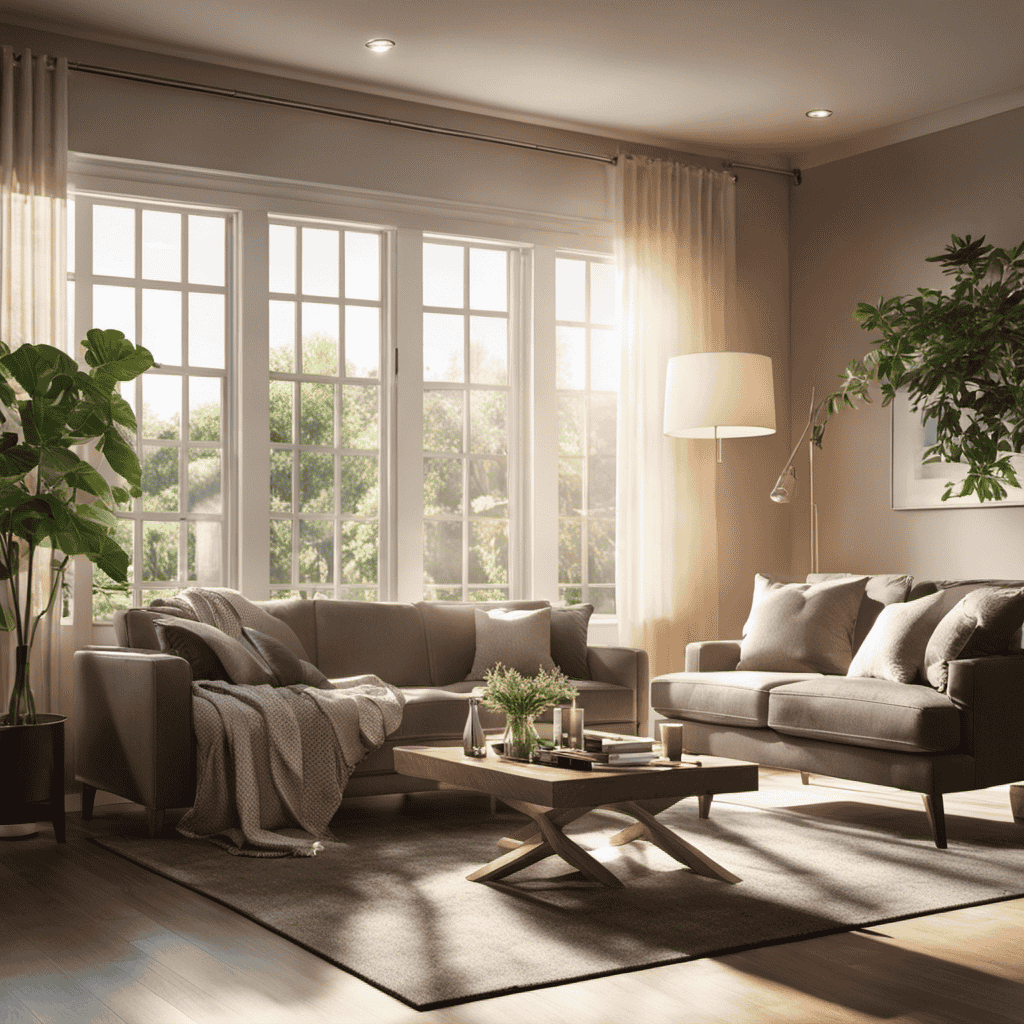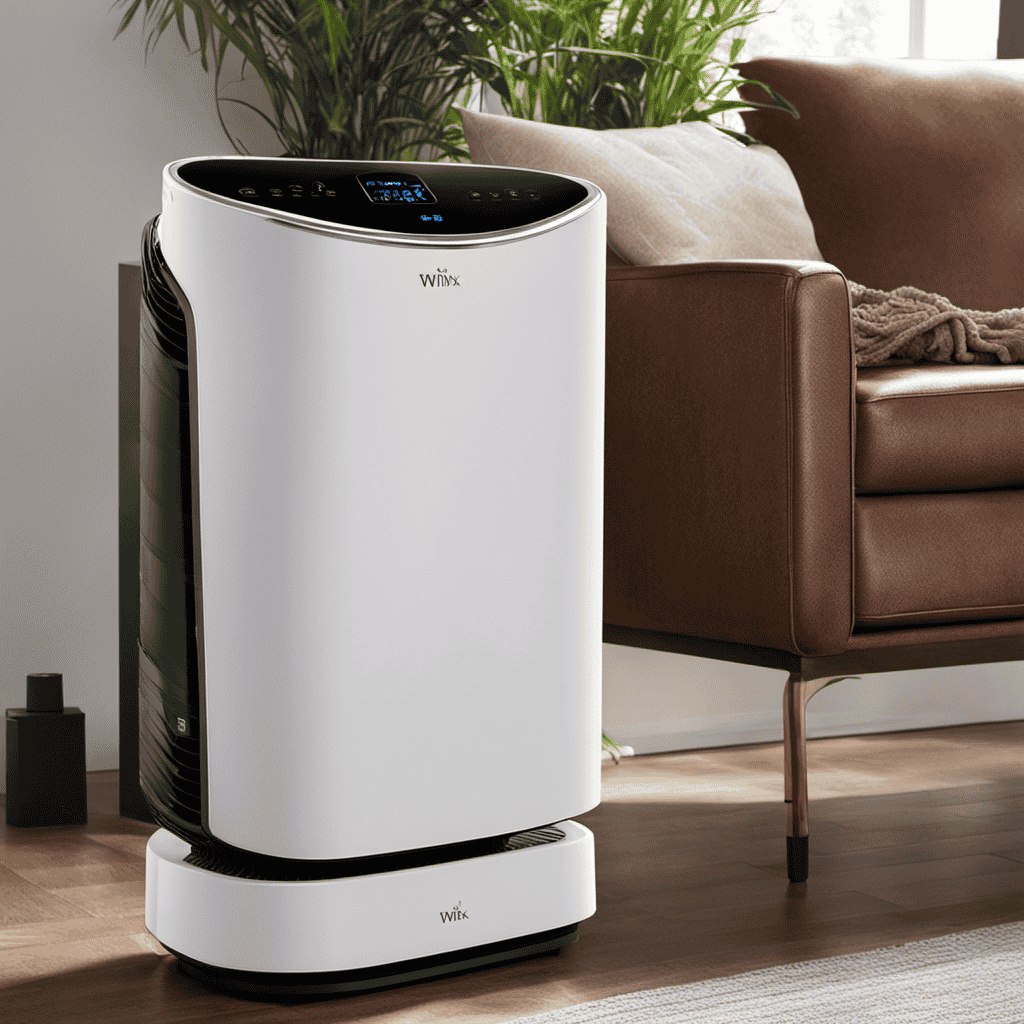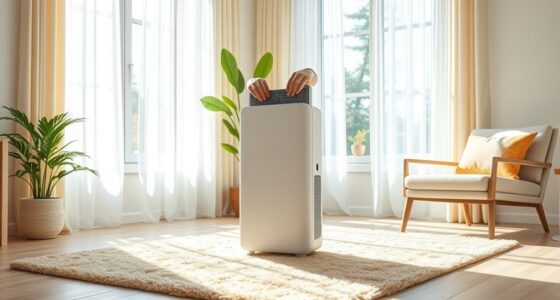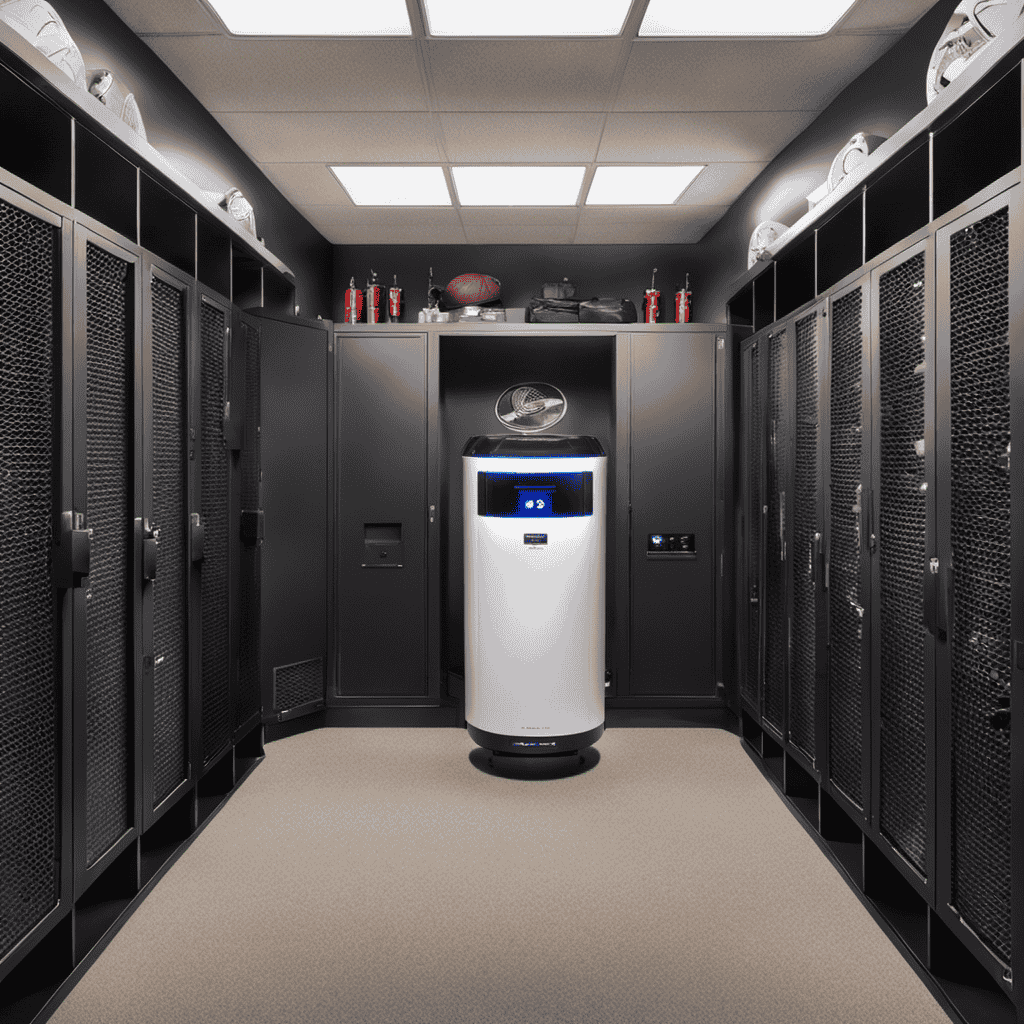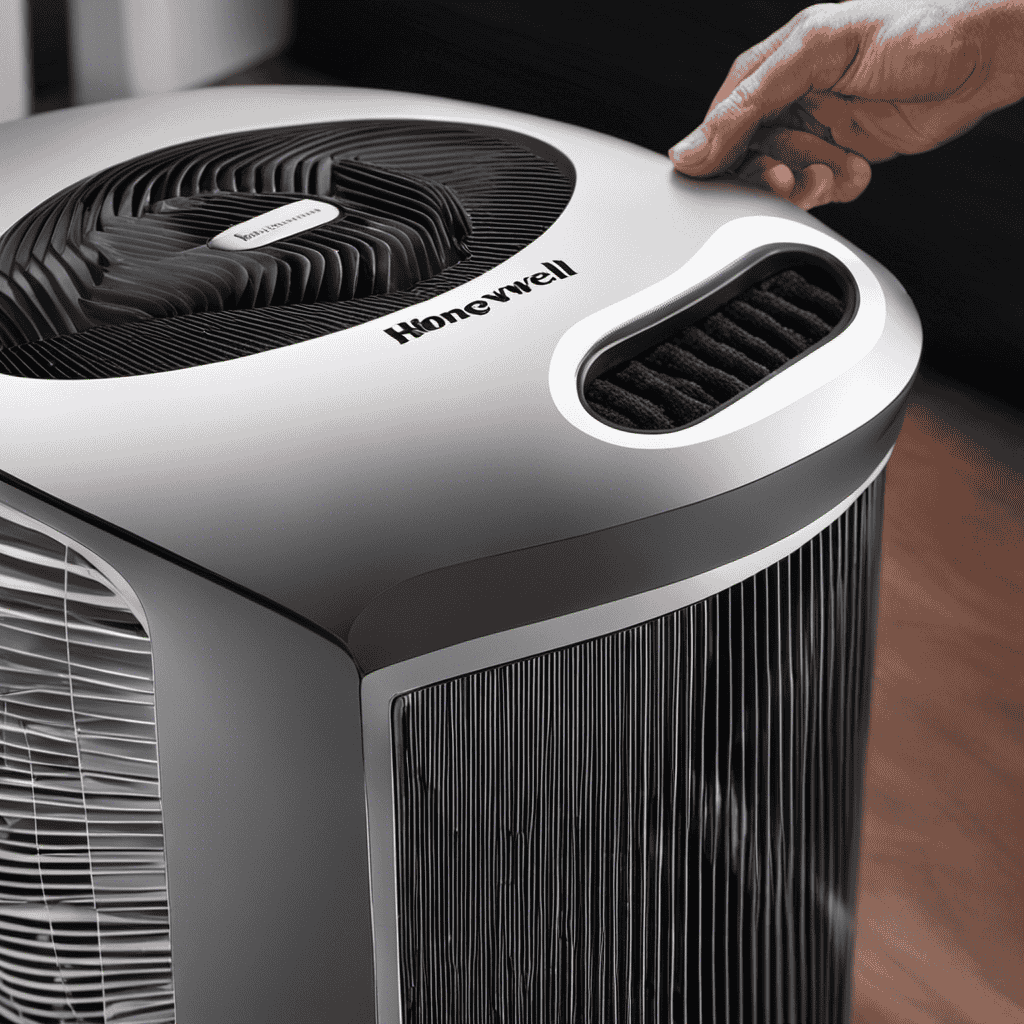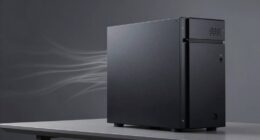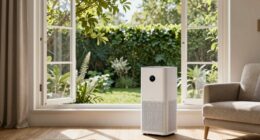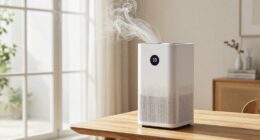Oh, how amazing technology is! In a world where clean air feels like a far-off fantasy, along comes the air purifier.
But just how effective are these machines at banishing the invisible pollutants that plague our indoor spaces?
Join me on a journey of scientific exploration as we delve into the functionality and performance of air purifiers.
We’ll explore the factors that affect their effectiveness, evaluate their performance, and discover the crucial role they play in improving indoor air quality.
So, let’s strap on our scientific goggles and get ready to uncover the truth about air purifiers.
Key Takeaways
- Air purifiers remove airborne particles and pollutants, improving indoor air quality.
- The effectiveness of an air purifier is influenced by factors such as room size and level of air pollution.
- Regular maintenance and cleaning routines are important for optimal performance and longevity of an air purifier.
- Air purifiers play a significant role in allergy prevention by removing allergens like dust, pollen, and pet dander from the air.
Understanding Air Purifiers’ Functionality
To understand how effective an air purifier is, you’ll need to know how it functions. Air purifiers work by removing airborne particles and pollutants from the air, improving indoor air quality. They employ a combination of filtration technologies such as HEPA filters, activated carbon filters, and ionizers to capture and neutralize harmful particles, allergens, and odors.
By filtering out dust, pollen, pet dander, and mold spores, air purifiers can provide several benefits. They can help alleviate allergies and asthma symptoms, reduce the spread of airborne viruses and bacteria, and create a cleaner and healthier living environment.
However, there are common misconceptions about air purifiers. They are not a magical solution to all air quality problems, and their effectiveness depends on factors such as the size of the room and the type and quality of the purifier. It’s important to choose an air purifier that is suitable for your specific needs and follow proper maintenance guidelines for optimal performance.
Factors Affecting Air Purifier Effectiveness
When choosing an air purifier, you should consider factors such as the size of the room and the level of air pollution. These factors can greatly affect the effectiveness of the air purifier in improving indoor air quality.
A larger room will require a more powerful purifier to effectively clean the air, while higher levels of pollution will require a purifier with advanced filtration technology.
Additionally, factors affecting the lifespan of an air purifier include the quality of the filters used and the maintenance and cleaning routines. Regularly replacing filters and cleaning the purifier can significantly extend its lifespan.
The benefits of using air purifiers include reducing the presence of airborne pollutants such as dust, pollen, and pet dander, which can improve respiratory health and alleviate allergies and asthma symptoms.
Evaluating Air Purifier Performance
One way to assess how well an air purifier performs is by checking its CADR rating. CADR stands for Clean Air Delivery Rate, and it measures the volume of clean air that the purifier can deliver in a specific amount of time. The higher the CADR rating, the more effective the purifier is at removing pollutants from the air. Evaluating an air purifier’s performance is important for maintaining its efficiency and ensuring its effectiveness in allergy prevention. Regular maintenance, such as cleaning or replacing filters, is crucial for optimal performance. Air purifiers play a significant role in allergy prevention by removing allergens like dust, pollen, and pet dander from the air. By efficiently filtering these particles, air purifiers can help alleviate allergy symptoms and improve indoor air quality.
| Criteria | CADR Rating |
|---|---|
| Dust | 100-400 |
| Pollen | 100-400 |
| Smoke | 100-400 |
| Air Changes per Hour | 4-6 |
| Room Size | 200-800 sq. ft. |
The Role of Air Purifiers in Indoor Air Quality
If you want to improve your indoor air quality, consider using an air purifier. Air purifiers play a crucial role in reducing allergies and improving respiratory health.
These devices work by removing harmful particles such as dust, pollen, pet dander, and mold spores from the air. By doing so, they can alleviate symptoms for allergy sufferers and provide relief for those with respiratory conditions such as asthma.
Numerous studies have shown the positive impact of air purifiers on respiratory health. For example, a study published in the Journal of Allergy and Clinical Immunology found that using an air purifier reduced asthma symptoms and improved lung function in children. Additionally, a review published in the Environmental Health Perspectives concluded that air purifiers can effectively remove airborne pollutants, leading to improved indoor air quality and respiratory health.
Comparing Different Types of Air Purifiers
To choose the right air purifier for you, consider comparing different types available on the market. Air purifiers offer several benefits, such as improving indoor air quality and reducing allergens, dust, and airborne pollutants. They can be a cost-effective solution for those suffering from respiratory conditions or allergies, as they can help alleviate symptoms and provide a cleaner breathing environment. When comparing air purifiers, it’s important to consider factors like the type of filtration system they use, the room size they can effectively clean, and the noise levels they produce. Here is a table comparing three common types of air purifiers:
| Type | Filtration System | Room Size Coverage |
|---|---|---|
| HEPA Air Purifier | High-Efficiency Particulate Air (HEPA) filter | Small to large rooms |
| Activated Carbon Air Purifier | Activated carbon filter | Small to medium rooms |
| Ionic Air Purifier | Ionization technology | Small rooms |
Comparing the different types of air purifiers will help you make an informed decision based on your specific needs and budget.
Tips for Maximizing Air Purifier Efficiency
When it comes to maximizing the efficiency of your air purifier, remember to regularly clean or replace the filters and keep the device running continuously. This will ensure that the air purifier is able to effectively remove contaminants from the air and improve the overall air quality in your space.
Here are some additional tips to help you get the most out of your air purifier:
-
Improve air circulation: Place the air purifier in a central location in the room to allow for better air circulation and distribution of purified air.
-
Select an appropriate filter: Different air purifiers come with different types of filters, such as HEPA filters or activated carbon filters. Choose a filter that is suitable for your specific needs, whether it’s removing allergens, odors, or particles.
-
Keep the surrounding area clean: Regularly dust and vacuum the room to minimize the accumulation of dust and dirt, which can reduce the efficiency of the air purifier.
-
Monitor and adjust the settings: Pay attention to the air quality indicators on your air purifier and adjust the settings accordingly to maintain optimal performance.
Following these tips will help you optimize the performance of your air purifier and ensure that you are breathing clean and fresh air.
Frequently Asked Questions
Can an Air Purifier Remove All Types of Pollutants From the Air?
Yes, an air purifier can remove various types of pollutants from the air. It is effective against airborne viruses and reduces allergens. Scientific evidence supports the effectiveness of air purifiers in improving indoor air quality.
Are Air Purifiers Safe to Use Around Children and Pets?
Yes, air purifiers are safe to use around children and pets. They effectively remove pollutants from the air, improving indoor air quality. However, it’s important to choose a purifier with a HEPA filter and regularly maintain it for optimal efficiency.
How Long Do Air Purifiers Typically Last Before Needing to Be Replaced?
Air purifiers typically last for several years before needing replacement. The cost of air purifiers varies depending on the type and features. Using air purifiers can provide numerous benefits, such as reducing allergens and improving indoor air quality.
Can an Air Purifier Eliminate Unpleasant Odors in the Air?
Yes, an air purifier can effectively eliminate unpleasant odors in the air. It filters out allergens and pollutants, reducing respiratory issues. It’s amazing how a simple device can improve indoor air quality.
Do Air Purifiers Consume a Lot of Energy and Increase Electricity Bills?
Air purifiers can vary in energy efficiency, but generally, they consume minimal energy. As a result, they have a negligible impact on electricity bills, making them an affordable and efficient solution for improving indoor air quality.
Is an Air Purifier Necessary for Improving Indoor Air Quality?
Many people underestimate the importance of air purifiers for improving indoor air quality. However, these devices play a crucial role in removing pollutants, allergens, and contaminants from the air, creating a healthier living environment. Investing in an air purifier can significantly enhance the quality of the air you breathe indoors.
Conclusion
In conclusion, air purifiers are like diligent guardians, tirelessly working to remove harmful pollutants from our indoor air.
By understanding the functionality of air purifiers and the factors that affect their effectiveness, we can make informed decisions when selecting one for our homes.
Evaluating their performance through measurements and comparing different types can help us choose the most suitable option.
Remember, maximizing air purifier efficiency requires regular maintenance and following recommended guidelines.
So, let these air purifiers be our steadfast companions in ensuring clean and healthy indoor air.
